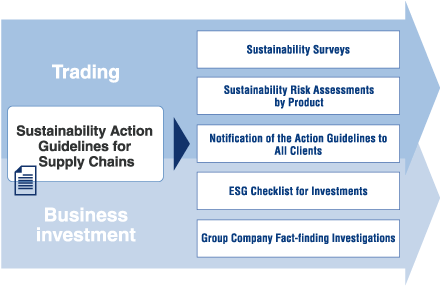Policy and Basic Concept
Supply Chains
ITOCHU gives consideration to human rights, labor and the environment in our supply chain and business investments. We do this through sustainability management tailored to each business activity. Through this, we have built a sustainable value chain, leading to an improvement in the competitiveness and corporate value of the ITOCHU Group.
Notifying Suppliers of the Sustainability Action Guidelines for Supply Chains
We believe it is important to acquire understanding and cooperation from our suppliers for our procurement policies. Accordingly, we once again notified approximately 4,000 suppliers with whom we engage in ongoing business of the Sustainability Action Guidelines for Supply Chains in FYE 2014. We also stipulated that new suppliers must be notified of these guidelines in advance when engaging in business with us starting in January 2015, and further stipulated that not only suppliers but all clients with whom we engage in ongoing business must be notified starting in FYE 2026, deeping communication about our sustainability policy.
Sustainability Action Guidelines for Supply Chains
ITOCHU adopted the “Sustainability Action Guidelines for Supply Chains” to clarify and communicate the sustainability concerns we expect all clients and business partners to address. We will take the necessary measures to communicate and cooperate with all clients to ensure responsible management of the following items.
Clients and business partners shall comply as follows:
- Abuse and Harassment
Respect the human rights of all of employees and not engage in inhumane treatment, including discrimination, harassment, abuse and corporal punishment. - Forced Labor and Child Labor
Prohibit forced labor or child labor including the employment of children under the minimum working age. - Discrimination
Prohibit employment discrimination based on characteristics including but not limited to gender, race, and religion. - Suitable Remuneration
Comply with statutory minimum wages, strive to exceed living wages, and not unjustly reduce wages. - Freedom of Association and Collective Bargaining
Respect the freedom of association and right to collective bargaining of employees and ensure that labor-management discussions on working conditions and environment are held, as appropriate. - Working Hours
Comply with statutory working hour restrictions. Properly manage employees’ working hours, provide holidays and paid leave as necessary and strictly prohibit excessive overtime work. - Safe and Healthy Working Environments
Take necessary measures to provide a safe, hygienic and healthy working environment to employees. - Environment
Give due consideration to avoiding negative impacts on natural capital and local communities from pollution and other environmental issues with regards to business activities. Take the necessary measures to reduce consumption of energy, water and other natural resources, as well as emissions of greenhouse gases and waste. - Anti-Corruption
Comply with all applicable local and international laws and regulations. Ensure compliance with fair business practices and anti-corruption, including prevention of conflicts of interest and anti-competitiveness. - Information Disclosure
Disclose information on all items listed above in a timely and appropriate manner.
Established in April 2009
Revised in April 2025

